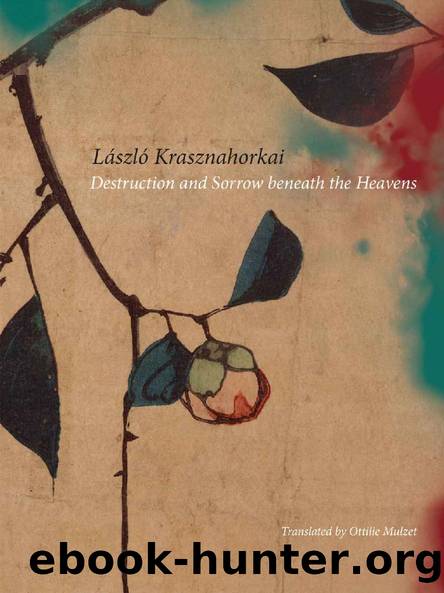Destruction and Sorrow beneath the Heavens (Hungarian List) by László Krasznahorkai

Author:László Krasznahorkai [Krasznahorkai, László]
Language: eng
Format: epub
ISBN: 9780857423122
Publisher: Seagull Books
Published: 2016-03-15T00:00:00+00:00
And then, if these conditions are met and the six months are up?
pinghui. After six months we have a look, to see if all the conditions have been metâif so, we cut the noviceâs hair. Then comes the shoujie,[120] then the phase of biqiu[121] for the men and biqiuni[122] for the women.
Stein is completely emboldened, because suddenly itâs as if they were really talking about something. Spurred on by a sudden idea, he says to the abbot that he has met with so many people in China, and he has always observed the forms of courtesy demanded by this country. Here, however, in this Buddhist temple, he does not consider this to be requisite. May he count on the understanding of the abbot? And may he say why he has come?
The face of Pinghui does not flinch for a second. He listens to the words of the interpreter without interrupting. He is thinking.
pinghui. Moments of prayer, when the believer stands in front of the Buddha with a pure soul, are extraordinarily important occasions. We have our festivals. For example, we commemorate the birth and death of Master Zhiyi, and every three years we have the Jiangjing festival lasting several days. Then, on the fifteenth day of the seventh lunar month, there is the Yulan fenghui[123] . . .
They have fallen back to that place where they keep falling: Stein is unexpectedly seized by an embittered audacity. He doesnât know what has suddenly come over him but, waiting after each sentence for the interpreter to render his words into Chinese, he takes no notice of what the abbot has just said and tells him what he thinks: that since he has arrived at this monastery, there has been deep sorrow in his heart. The interpreter stares at Stein. He tells the interpreter, if he can, to translate word for word. He has been full of pain, he continues, because what is important to him, the spirit of Chinese classical culture, its beauty, its strength, has disappearedâit disappeared a long time ago. Because for years he deluded himself that there was a point to his own research here, in modern China, and that he didnât want to acknowledge how ridiculous it was, how truly pathetic.
The question never really gets to Pinghui, at least not in the form of words, because heâs already waving down the interpreter, this time clearly in great impatience when he gets to the part of Steinâs statement which deals with classical culture. Stein is convinced that the abbot knows full well, in fact knows with dead certainty what he is saying; moreover, that he knows, even without words, what Stein wants.
pinghui. In my opinion, classical culture has not vanished at all. Once again, you can see the buildings, paintings and calligraphy, all from the classical tradition and now restoredâfrom that I draw the conclusion that this culture is still alive. There are the traditional ceremonies as well. These too have remained, even if in a somewhat different form. In the Japanese tea ceremony, the outward forms are the most important.
Download
This site does not store any files on its server. We only index and link to content provided by other sites. Please contact the content providers to delete copyright contents if any and email us, we'll remove relevant links or contents immediately.
Asking the Right Questions: A Guide to Critical Thinking by M. Neil Browne & Stuart M. Keeley(5752)
Autoboyography by Christina Lauren(5225)
Eat That Frog! by Brian Tracy(4518)
Dialogue by Robert McKee(4385)
Sticky Fingers by Joe Hagan(4186)
Journeys Out of the Body by Robert Monroe(3610)
Annapurna by Maurice Herzog(3464)
Full Circle by Michael Palin(3443)
Schaum's Quick Guide to Writing Great Short Stories by Margaret Lucke(3369)
Elements of Style 2017 by Richard De A'Morelli(3338)
The Art of Dramatic Writing: Its Basis in the Creative Interpretation of Human Motives by Egri Lajos(3058)
Atlas Obscura by Joshua Foer(2950)
Why I Write by George Orwell(2944)
The Diviners by Libba Bray(2927)
The Fight by Norman Mailer(2924)
In Patagonia by Bruce Chatwin(2919)
The Mental Game of Writing: How to Overcome Obstacles, Stay Creative and Productive, and Free Your Mind for Success by James Scott Bell(2897)
Venice by Jan Morris(2568)
The Elements of Style by William Strunk and E. B. White(2469)
